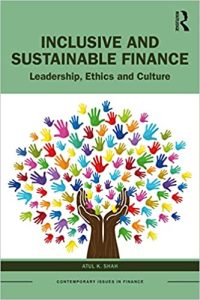In Inclusive and Sustainable Finance: Leadership, Ethics and Culture, Atul Shah argues for business and finance practices that embrace cultural influences over the technocratic models that predominate in our globalised world. With examples from diverse contexts including the Dharma religions, this book makes a convincing case that recognising how culture has informed business practices can create more inclusive and effective solutions to global problems, writes Anand Vaidya.
Inclusive and Sustainable Finance: Leadership, Ethics and Culture. Atul Shah. Routledge. 2022.
Find this book (affiliate link):![]()
 Inclusive and Sustainable Finance: Leadership, Ethics and Culture by Atul Shah offers an alternative way of theorising and practicing financial leadership and business ethics. In developing a theory of sustainable finance, it looks to practices from diverse traditions and communities, examining how the realms of business and finance interact with other aspects of our lives, including religion and culture. This approach is valuable for a number of reasons. Firstly, we live and do business in a global context where cultural differences make business differences. Secondly, in teaching materials on business and finance ethics, there has been relatively little emphasis on how they are interwoven with these other traditions. Thirdly, it is only by introducing ideas from outside of the status quo that we can adequately challenge it. This is Shah’s third book, following Jainism and Ethical Finance: A Timeless Business Model (co-authored by Aidan Rankin), and Reinventing Accounting and Finance Education: For a Caring, Inclusive and Sustainable Planet. This new book is divided into five chapters which explore different emphases that can be harnessed to make finance and business practices more inclusive and sustainable: (i) Morality, (ii) Tradition, (iii) Community, (iv) Experience, and (v) Purpose. Shah chooses this set-up because there is a deep interplay between morality, tradition, and community that informs large issues in finance. In addition, he wants to make a connection to both experience and purpose in relation to how one sees business in general.
Inclusive and Sustainable Finance: Leadership, Ethics and Culture by Atul Shah offers an alternative way of theorising and practicing financial leadership and business ethics. In developing a theory of sustainable finance, it looks to practices from diverse traditions and communities, examining how the realms of business and finance interact with other aspects of our lives, including religion and culture. This approach is valuable for a number of reasons. Firstly, we live and do business in a global context where cultural differences make business differences. Secondly, in teaching materials on business and finance ethics, there has been relatively little emphasis on how they are interwoven with these other traditions. Thirdly, it is only by introducing ideas from outside of the status quo that we can adequately challenge it. This is Shah’s third book, following Jainism and Ethical Finance: A Timeless Business Model (co-authored by Aidan Rankin), and Reinventing Accounting and Finance Education: For a Caring, Inclusive and Sustainable Planet. This new book is divided into five chapters which explore different emphases that can be harnessed to make finance and business practices more inclusive and sustainable: (i) Morality, (ii) Tradition, (iii) Community, (iv) Experience, and (v) Purpose. Shah chooses this set-up because there is a deep interplay between morality, tradition, and community that informs large issues in finance. In addition, he wants to make a connection to both experience and purpose in relation to how one sees business in general.
We live and do business in a global context where cultural differences make business differences.
College textbooks that teach students how to reason ethically in business often present three lenses through which to think about business problems: (i) Deontology, a theory of ethics that derives from Kant, which uses rationality and obligations; (ii) Utilitarianism, a theory of ethics that derives from Mill, which uses the idea that the correct action to take is the one that maximizes aggregate welfare; and (iii) Virtue theory, a theory of ethics that derives from Aristotle, which uses the idea of aiming to act in accordance with virtues like justice, courage and temperance. Other than a few books like Judith Boss’s Think, most business ethics books do not discuss any non-western theory of ethics or any religion-based approach to business. However, according to a 2010 Pew Research Center study of more than 230 countries and territories, about 85% of the world’s people identify with a religion. Given that business is practiced globally, and a large majority of people identify as religious, business ethics based in religious traditions should be as worthy of serious study as non-religious approaches.
Given that business is practiced globally, and a large majority of people identify as religious, business ethics based in religious traditions should be as worthy of serious study as non-religious approaches.
Shah writes, ‘The business curriculum has been colonized by western world views and theories, with secular neo-liberal and materialist economics at its root. Globalization and standardization have directly attacked the real diversity of cultures, beliefs and institutions across the planet (3).’ Notably, there are two parts to this claim: one about colonisation and standardisation, the other about whether the traditions being left out really have anything to offer. Shah investigates and defends the view that the Indian dharma traditions, which hold that religious duty is the primary foundation upon which to build wisdom and happiness, can help to alleviate modern problems, such as climate change and inequality. Shah asks, ‘Old cultures and traditions which are outside the theories and equations have sustained themselves over hundreds or even thousands of years and many generations. … Do we have something to learn from them..?’ (43). He answers this question with a resounding yes, in part by interviewing several people who take seriously using culture and tradition to guide business, such as Jasvant Modi (a doctor in California who is also a businessman), Satish Kanabar (a Ugandan Asian refugee who rose to become a Corporate Director with Barclays Bank), and John Christensen (the founder of the global Tax Justice Network). For example, in the case of Dr Modi, he has done a tremendous amount of philanthropic work to support the Jain community and humanity in general. Outside of running many medical institutions and a practice, he has donated several millions of dollars to establish endowed chairs for the Jain community at major universities around the world. He does this not only to help develop scholarship around Jainism, but also to spread the word about the dharmic tradition, and to apply the principles of Jainism to important issues of our time: food ethics, climate ethics, and sustainable business practices.
The language of modern finance, bristling with equations and mathematical models, buries ethics.
According to Shah, the language of modern finance, bristling with equations and mathematical models, buries ethics. Shah claims that the modern tendencies towards commodification and objectification are devoid of cultural and ethical reflexivity due to the separation between financial engineering, political economy and science, and ethics. This separation has long been the main mode for educating MBAs and finance majors. Thus, he argues, students fail to learn and develop the kind of values that have been rooted in various cultural and religious traditions for thousands of years: those which emphasise the interconnection between these aspects of life rather than considering them as separate. Instead of students looking for the highest-paying job, Shah prefers a workforce that would seek ways of serving their community and the world at large, prioritising innovation, social enterprise and environmental sustainability, while at the same time producing new products and services that are profitable.
Shah’s book offers examples from history to support his argument, such as practices of lending within Jain communities. These practices suggest that lending is part of a service to a community for long-term communal benefit, rather than a way for a bank to extract profit through interest. By re-contextualising finance within the Dharma traditions, he presents a picture of how these traditions reconceptualise finance education to meet what he views as the rising problems of economic inequality and threats to the global environment such as wars and the climate crisis. By reconnecting finance with religious traditions, Shah plots a new course for business education, one that reconnects students to the diverse ethical traditions that have informed human development. Overall, Inclusive and Sustainable Finance is a useful resource for educators in finance, business ethics, and for the general business professional interested in developing a better understanding of the global roots of their field.
Note: This review gives the views of the author, and not the position of the LSE Review of Books blog, or of the London School of Economics and Political Science. The LSE RB blog may receive a small commission if you choose to make a purchase through the above Amazon affiliate link. This is entirely independent of the coverage of the book on LSE Review of Books.
Main Image: Raimond Klavins on Unsplash.






